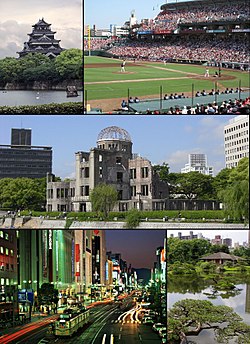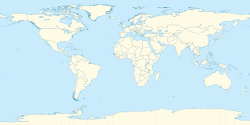Hiroshima
- Para sa ibang gamit, Hilingon an Hiroshima (klaripikasyon).
An Hiroshima (広島市 Hiroshima-shi, Hapones: [çiɾoɕima]) iyo an kapitolyo kan Prepekturang Hiroshima dangan an pinakadakulang syudad sa Rehiyon Chūgoku kan sulnupang Honshu – an pinakadakulang isla kan Hapon. Nakua kan Hiroshima an estado nin syudad kan Abril 1, 1889. Kan Abril 1, 1980, naging pigdesignar na syudad an Hiroshima. Hasta Agosto 2016, pigtatantya an populasyon kan syudad, mga 1,196,274. An gross domestic product (GDP) sa Pinakadakulang Hiroshima, Hiroshima Urban Employment Area, nasa US$61.3 bilyon hasta kan 2010.[2][3] Si Kazumi Matsui an naging Alkalde Syudad poon pa kan Abril 2011.
Hiroshima 広島市 | |||
|---|---|---|---|
| Syudad kan Hiroshima[1] | |||
 Poon Taas nin wala: Kastilyong Hiroshima, kawat nin beysbol kan Hiroshima Toyo Carp sa Hiroshima Municipal Baseball Stadium, Hiroshima Peace Memorial (Genbaku Dome), pambangging tanawon kan Ebisu-cho, Shukkei-en (Parkeng Asano) | |||
| |||
 Kinamumugtakan kan Hiroshima sa Prepekturang Hiroshima | |||
| Tagboan: 34°23′N 132°27′E / 34.383°N 132.450°ETagboan: 34°23′N 132°27′E / 34.383°N 132.450°E | |||
| Nasyon | Hapon | ||
| Rehiyon | Chūgoku (San'yō) | ||
| Prepektura | Prepekturang Hiroshima | ||
| Pamamahala | |||
| • Alkalde | Kazumi Matsui | ||
| Hiwas | |||
| • Kabuuhan | 906.53 km2 (350.01 sq mi) | ||
| Populasyon (Agosto 1, 2016) | |||
| • kabuuhan | 1,196,274 | ||
| • Densidad | 1,319.6/km2 (3,418/sq mi) | ||
| Mga demonym | mga taga-Hiroshima | ||
| Sona nin oras | UTC+9 (Estandarteng Oras kan Hapon) | ||
| Puon | Camphor Laurel | ||
| Burak | Oleander | ||
| Numero nin Pono | 082-245-2111 | ||
| Address | 1-6-34 Kokutaiji, Naka-ku, Hiroshima-shi 730-8586 | ||
| Websityo | www | ||
| Hiroshima | |||||
| Pangaran na Hapones | |||||
|---|---|---|---|---|---|
| Kyūjitai | 廣島 | ||||
| Shinjitai | 広島 | ||||
| |||||

An Hiroshima an enot na syudad na pigtarget kan saróng armas nukleyar, kan an United States Army Air Forces (USAAF) pighulog an bomba nin atomiko sa syudad sa oras na 8:15 a.m. kan Agosto 6, 1945, haraní sa katapusan kan Ikaduwang Gerang Pankinaban.[4]
Hilingon man
baguhonMga Talá
baguhon- ↑ The City of Hiroshima official web site Archived 2020-02-25 at the Wayback Machine. (Ingles)
- ↑ Yoshitsugu Kanemoto. "Metropolitan Employment Area (MEA) Data". Center for Spatial Information Science, The University of Tokyo.
- ↑ Conversion rates – Exchange rates – OECD Data
- ↑ Hakim, Joy (5 January 1995). A History of US: Book 9: War, Peace, and All that Jazz. New York: Oxford University Press. ISBN 978-0195095142.
Mga Toltolan
baguhon- Ishikawa, Eisei, David L. Swain (1981). Hiroshima and Nagasaki: The Physical, Medical, and Social Effects of the Atomic Bombings. Basic Books.
- Kowner, Rotem (2002). "Hiroshima". In M. Ember; C. Ember. Encyclopedia of Urban Cultures (Vol. II). Grolier. pp. 341–348. ISBN 0717256987.
Mababasa pa lalo
baguhon- Pacific War Research Society, Japan's Longest Day (Kodansha, 2002, ISBN 4770028873), the internal Japanese account of the surrender and how it was almost thwarted by fanatic soldiers who attempted a coup against the Emperor.
- Richard B. Frank, Downfall: The End of the Imperial Japanese Empire Penguin, 2001 ISBN 0141001461)
- Robert Jungk, Children of the Ashes, 1st Eng. ed. 1961[1]
- Gar Alperovitz, The Decision to Use the Atomic Bomb, ISBN 067976285X
- John Hersey, Hiroshima, ISBN 0679721037
- Michihiko Hachiya, Hiroshima Diary: The Journal of a Japanese Physician, August 6 – September 30, 1945 (Chapel Hill: University of North Carolina Press, 1955), since reprinted.
- Masuji Ibuse, Black Rain, ISBN 087011364X
- Tamiki Hara, Summer Flowers ISBN 069100837X
- Robert Jay Lifton Death in life: The survivors of Hiroshima, Weidenfeld & Nicolson 1st edition (1968) ISBN 0297764667
Mga Panluwas na Takod
baguhon| An Wikimedia Commons igwa nin medya dapit sa Hiroshima. |
| An Wikivoyage igwang saróng giyang panbiyahe para sa Hiroshima. |
- Official website (Hapones)
- Hiroshima City official website Archived 2015-02-18 at the Wayback Machine. (Ingles)
- Official tourist information website (in 5 languages)
- Hiroshima before and after atomic bombing – interactive aerial maps
- Hiroshima atomic bomb damage – interactive aerial map
- Is Hiroshima still radioactive? Archived 2021-11-04 at the Wayback Machine. – No. Includes explanation.
- Peter Rance's 1951 Hiroshima Photographs at the Wayback Machine (archived November 12, 2007)
- City Mayors article
- CBC Digital Archives – Shadows of Hiroshima
- Hiroshima Map Archived 2012-11-27 at the Wayback Machine. – interactive with points of interest
- BBC World Service BBC Witness programme interviews a schoolgirl who survived the bomb
- Hope Elizabeth May, "Creating Peace through Law: the City of Hiroshima" Archived 2017-07-05 at the Wayback Machine.
- hiroshima-navi
- "Hiroshima" By John Hersey, A Reporter at Large August 31, 1946 Issue of The New Yorker
- ↑ "Gyanpedia.in" (PDF). Archived from the original (PDF) on 2017-12-26. Retrieved 2018-11-08.




